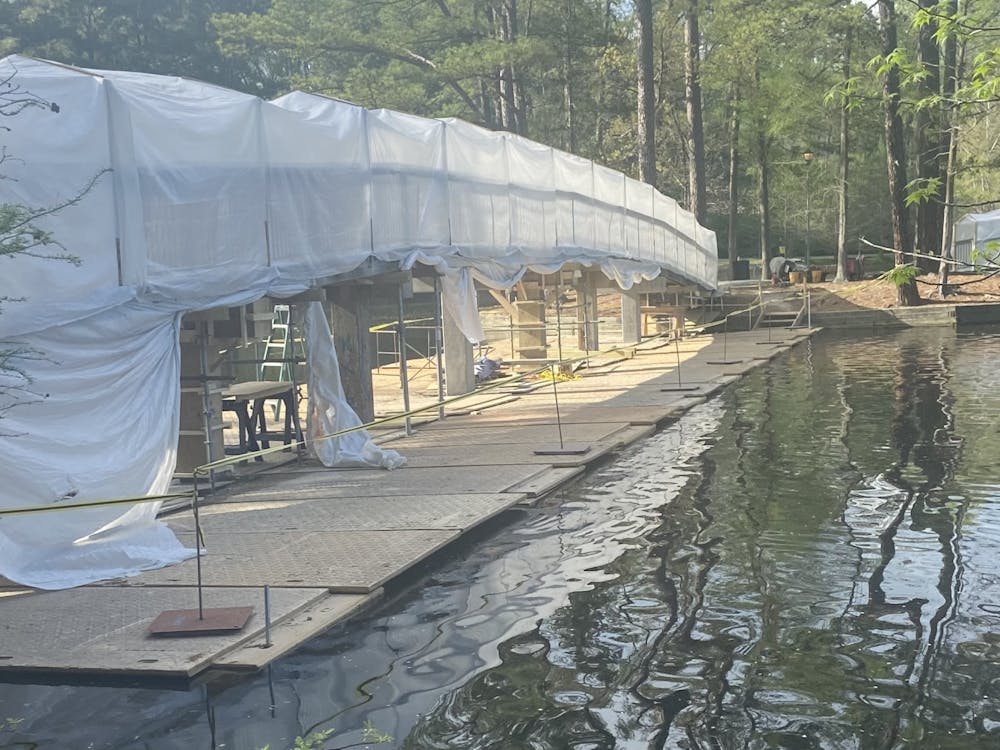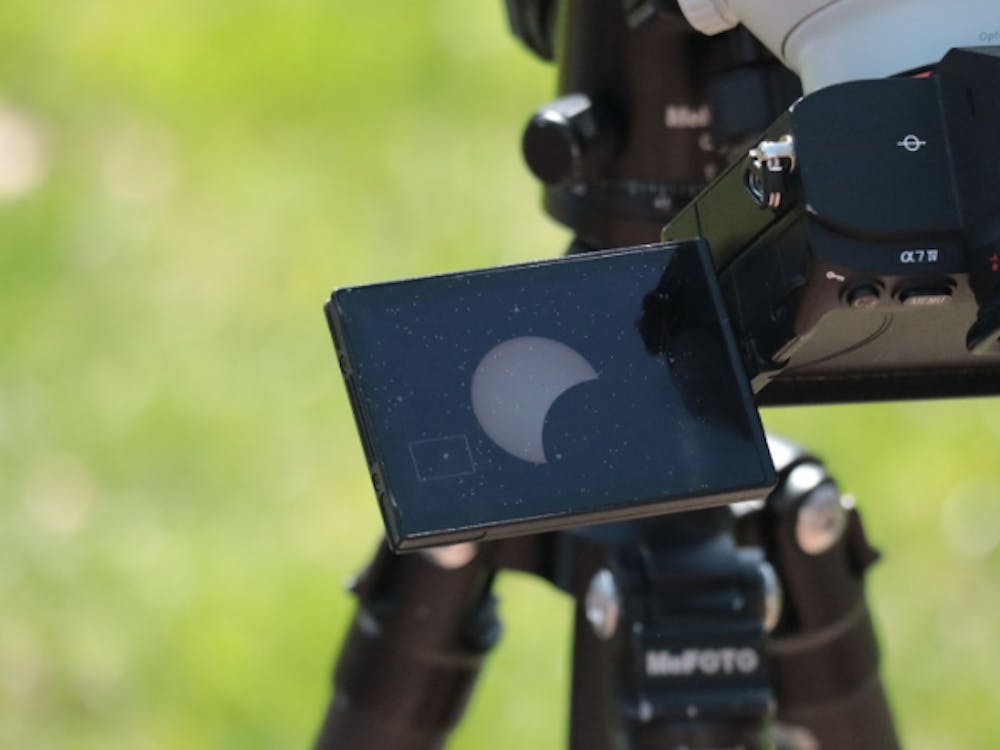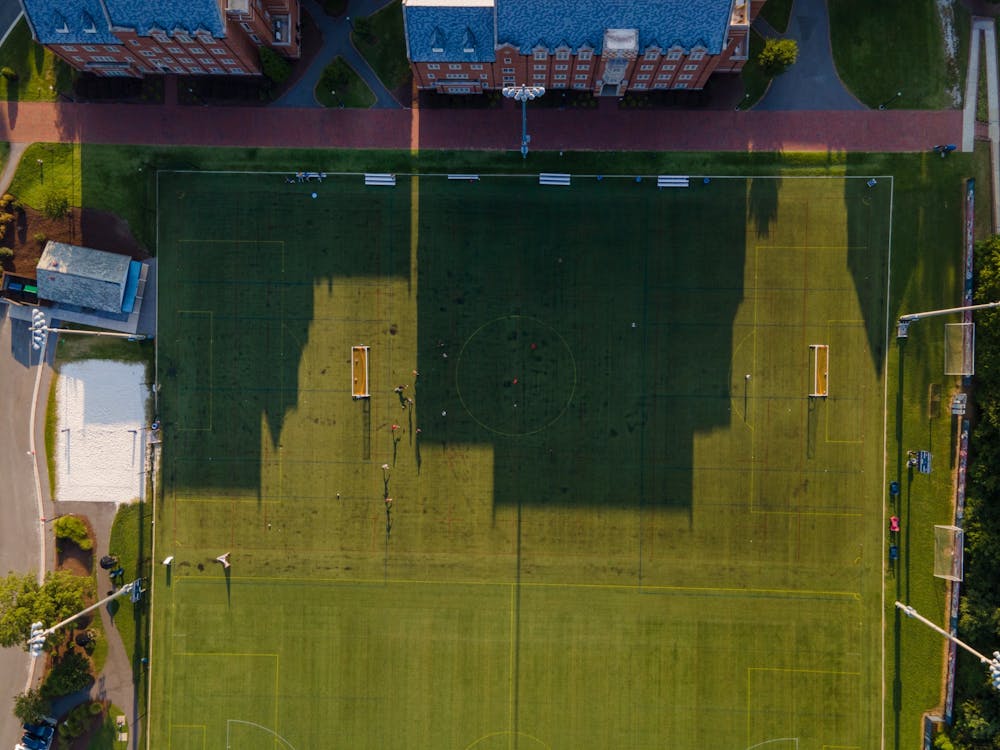Flyers found around the University of Richmond campus described the connection between E. Claiborne Robins and the A.H. Robins Company's involvement in the distribution and marketing of the Dalkon Shield IUD, which led to the death and infertility of many women in the 20th century.
The flyers were posted on the same day red paint and the word “murderer” were discovered in front of the Robins statue on March 30. The paint was removed from the statue by 10:30 the same morning.

Red paint was found on the statue of E. Claiborne Robins on the University of Richmond's campus. The word "murderer" was painted in front of the statue.
The flyers include information on the number of women negatively affected by the Dalkon Shield IUD, a contraceptive device that was bought and sold by Robins's family pharmaceutical company. The company sold the IUDs to around 2.5 million women during the early 1970s, according to a New York Times article.
According to the flyer, the Dalkon Shield IUD left 21 women dead, 13,000 infertile, 900,000 injured in the U.S. and an unknown number of women injured in the global south. The flyers also stated that the Robins Company “intentionally hid information from the public, cut safety measures for profit and dismissed victims as promiscuous.”
A QR code on the flyer connects to a Linktree including other resources about the Dalkon Shield IUD.
A study conducted by Dr. Nancy Lee in the 1980s revealed that the Dalkon Shield was riskier than other IUDs and increased women's risk of developing pelvic inflammatory disease (PID) five times more than other IUDS, according to a New York Times article. The Robins Company never acknowledged the dangers that its IUD presented, but it ultimately took the contraceptive off the market in 1974, according to a Los Angeles Times article.
The Dalkon Shield killed 18 women in the United States and impaired or diminished the ability of other women who developed PID to bear children, according to an article in the Multinational Monitor.
No charges of criminal negligence were brought against the Robins family, according to a Los Angeles Times article. After multiple multi-million dollar lawsuits, Robins agreed to a $2.4 billion trust fund that would be divided among victims of the Dalkon Shield IUD, according to the article.
The Robins name is memorialized in multiple areas of UR's campus.
Robins and his family donated a large sum of money to UR, including a $50 million donation in 1969, according to an Associated Press article. A number of buildings on campus are named after members of the Robins family, including Lora Robins Court, Robins Athletic Center, Robins School of Business and Robins Stadium, according to the UR website.
The paint placed on the Robins statue is not the first instance that language surrounding Robins's involvement in the Dalkon Shield controversy has appeared on campus. In a GenerationActionUr Instagram post from 2017, a number of posters were placed at the bottom of the statue.
Enjoy what you're reading?
Signup for our newsletter
The posters echoed the data and message that appeared on the flyers posted on March 30, including a poster that read, “2,000,000 sold, 40,000 lawsuits, 90,000 complications, 13,000 sterilizations, 21 dead,” alluding to the victims of the IUD that was sold by A.H. Robins.
Paint similar to that seen on the Robins statue has been used to bring attention to the names of those memorialized on other campus buildings in recent weeks. The marking of the buildings signs followed the discussion of changing the names of Mitchell-Freeman and Ryland halls because of the men's connections to slavery and segregation.
The Board of Trustees has suspended their decision on changing the names of the buildings as of April 5.
Contact news co-editor Westen Doran at westen.doran@richmond.edu.
Support independent student media
You can make a tax-deductible donation by clicking the button below, which takes you to our secure PayPal account. The page is set up to receive contributions in whatever amount you designate. We look forward to using the money we raise to further our mission of providing honest and accurate information to students, faculty, staff, alumni and others in the general public.
Donate Now
![A flyer taped to a lamp post outside of the Carole Weinstein International Center stating that "E. [Claiborne] Robins sold and profited from from the Dalkon Shield IUD which left... 21 women dead, 13,000 women infertile, and 900,000 injured."](https://snworksceo.imgix.net/urc/e3b3938a-81f6-41b9-93db-4aff67e14c7c.sized-1000x1000.jpg?w=1000)


